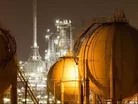LNG surpassing coal and iron ore in Australia

While the coal and iron ore boom in Australia has already seen its peak, Aussies are now shifting their attention to the emerging Liquefied Natural Gas (LNG) market.
As our sister site Business Review Australia reported, LNG is expected to surpass iron ore as Australia’s main export by the year 2020.
Australia has prospered through the commodities boom of coal and iron ore over the past 10 years, largely due to a wealth of resources as well as energy sector reforms. Already the world’s fifth-largest coal producer, Australia is also the second-largest coal exporter.
RELATED TOPIC: Rio Tinto scales back, lowers iron ore guidance for 2015
The majority of Aussie coal products are exported to Asia, but coal still provides about 69 percent of the nation’s electricity. Iron ore and coal are Australia’s top two largest sources of export revenue, as 459 million tons of coal was mined and 336 million tons was exported to generate $50 billion into the economy back in 2013.
However, as China’s growth continues to slow and commodities are oversupplied after resource companies over-estimated future demand, Australia faced some tough problems that were nearly all solved by LNG.
RELATED TOPIC: Iron ore rebound returns hope to the industry
A mixture of international and Aussie companies have combined to invest about $200 billion to expand Australia’s LNG capacity over the last few years, as they’ve begun the process of building eight new projects. This will quadruple Australia’s output of LNG to over 80 million tons per annum.
All together, the Australian Ministry of Energy anticipates Australia’s annual earnings from energy exports and commodities are expected to soar as high as $114 billion over the next five years.
Now, Australia is expected to rival Qatar as the largest supplier of the natural gas around the globe by 2018. With the help from Chevron and Royal Dutch Shell Plc developing Aussie projects to supply Asia’s demand, Australia is getting help from LNG despite rising energy prices that may hurt the industry’s returns.
RELATED TOPIC: United Kingdom says goodbye to coal mining
Over the next six months, LNG prices could drop as far as $7 per million British thermal units (Btu) before leveling off between $8-10 due to weaker demand in Japan and South Korea. Australia’s dominance of the LNG market as well as the country’s rise as an emerging energy power may also impact the nation’s foreign policy down the line.
Aussies appear to be leaving coal and iron ore in the past, as the country heads down the path toward becoming the world’s new energy superpower behind LNG.
Stay connected! Follow us on Twitter and like us on Facebook
Featured Articles
A fleet of Huaneng Ruichi autonomous electric mining trucks have been deployed in China, supported by Huawei's Cloud Services and 5G-Advanced network
Rio Tinto completed its US$6.7bn acquisition of Arcadium Lithium, making it a key company in raw materials mining for batteries in the energy transition
Intel first began to work towards responsibly sourced conflict minerals from the Democratic Republic of Congo and adjoining countries about 12 years

